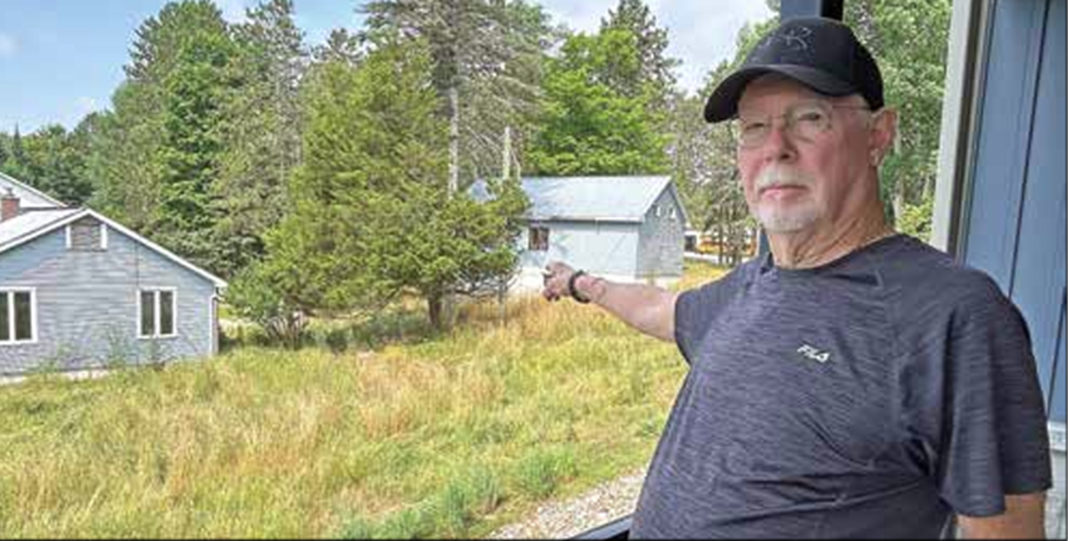Dysart et al council has closed the door on a proposal seeking to temporarily rezone land in Haliburton village, close to Hal High, that would have permitted a three-year glamping operation.
Elected officials voted unanimously to turn down an application from the owners of 77 Wallings Rd. to establish a six-pod glamping service on the 2.2-acre property. During a July 22 public meeting, Kris Orsan, Dysart’s manager of planning, said the applicant was seeking relief of the township’s temporary-use bylaw under Section 39 of the Planning Act to permit the structures, which would be used as shortterm accommodation for vacationers.
The pods are self-contained pre-fab structures designed to sleep two people, with a maximum of 12 people allowed on-site. They would be located at the front of the property, away from the shore of Head Lake.
Savas Varadas, principal planner at Huntsville-based consulting firm Plan Muskoka, which represents the owners, told council he felt the proposal was “fairly low impact” and not unaligned with neighbouring land-uses, which are predominantly residential.
“The glamping pods are fairly nondestructive to construct. They’ll be placed on a platform without the need for a foundation, which makes them easily removed at the end of the three-year period,” Varadas said, noting an existing building would serve as a washroom facility. There is enough parking on site to allow for more than one vehicle per pod.
Varadas added the owner is willing to install fencing and plant trees around property lines, to address public concern, and establish a vegetative buffer around the shoreline.
Coun. Nancy Wood-Roberts was the first to shoot down the proposal.
“This does not meet any of the guidelines [within] Section 39 of the Planning Act – it doesn’t serve a temporary need or broader public interest, it appears to only serve a financial interest of the property owner,” Wood-Roberts said.
She noted the property is zoned, partially, to support residential development, which the community is in desperate need of.
“This is not meeting that guideline. It doesn’t meet any long-term needs of the community. The official plan specifically identifies this type of recreation and commercial use be outside the settlement area. I do find it to be an incompatible use,” Wood-Roberts added.
Neighbours’ concerns
Doug and Mardi Tindal, who own a condo next door at 75 Wallings Rd., opposed the application. While the pair “lean more to YIMBY (yes in my backyard) than NIMBY (not)” they were concerned about possible noise, impacts to groundwater supply and traffic, and potential future-uses.
The couple felt the municipality would have a hard time reacting to noise complaints after regular work hours, when the site would be most frequently used. They also questioned the use of a May 2017 traffic count study, submitted by the applicant and completed two years prior to the construction of their condo building. The report indicated the area could handle increased traffic flow.
“No one who has tried to turn left out of Wallings Road [during summer] would find a May-based study credible… no matter what the year,” the Tindals wrote.
The County, which holds approval authority as the owner of County Road 21, which Wallings Road flows from, had no objections to the proposal.
Pete Mitchell, a director at Haliburton Condominium Corporation, felt the “intrusion and commotion” the glamping operation would bring “simply doesn’t work for us, or the neighbourhood at large.”
Given the pods would be fitted with electric heaters for use through three seasons, Mitchell feared how that additional pressure would impact the area’s weak hydro service.
“We’ve only been provided a phase-one service… the condo building is already challenged to provide additional services to its owners due to power limitations,” Mitchell said.
Varadas asked that the issue be deferred to give his client time to respond to questions and concerns, but council was having none of it. Coun. Pat Casey echoed WoodRoberts’ concerns, saying the glamping feature wouldn’t be a good fit in a high-density residential area. Coun. Barry Boice said he didn’t see any point deferring, believing council was firm in its position.
Deputy mayor Walt McKechnie was worried how the township would police noise and occupancy complaints; mayor Murray Fearrey commented the operation “should be in the bush or rural area, where it belongs,”; coun. Tammy Donaldson said, “it’s a great idea, it’s just on the wrong property,”; while coun. Carm Sawyer also expressed opposition.
“I love camping too, but camping is in the woods not on the main street of town,” Sawyer said.





